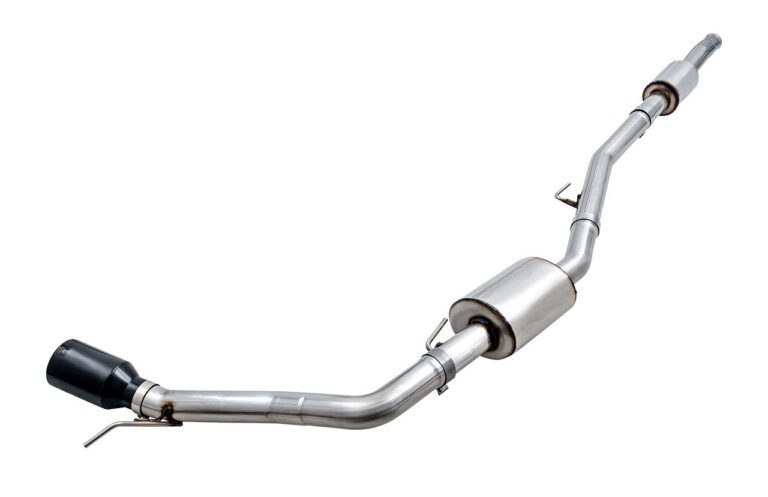Is It Dangerous to Drive With a Bad Catalytic Converter? The Risk and Reality Revealed
Driving with a bad catalytic converter can be dangerous due to the potential release of harmful emissions and the risk of engine damage. The catalytic converter is an essential component of the vehicle’s exhaust system, responsible for reducing the levels of harmful pollutants emitted from the engine.
When it malfunctions or becomes clogged, it can lead to increased emissions, reduced engine performance, and overheating issues. In addition, driving with a faulty catalytic converter may result in failing an emissions test and even a potential fine. It is crucial to address any issues with the catalytic converter promptly to ensure safe and efficient vehicle operation.

Credit: www.hrw.org
The Basics Of A Catalytic Converter
The catalytic converter is an essential component of a vehicle’s emissions control system. It plays a critical role in reducing harmful pollutants and converting them into less harmful gases before they are released into the atmosphere. This device contains a catalyst, usually made of platinum, palladium, and rhodium, which promotes chemical reactions that convert pollutants like carbon monoxide, nitrogen oxides, and hydrocarbons into water vapor, carbon dioxide, and nitrogen.
Driving with a failing catalytic converter can have serious consequences. Not only does it increase harmful emissions, but it can also lead to poor fuel efficiency, engine performance issues, and even engine damage. It is crucial to be aware of the common signs of a failing catalytic converter, such as a sudden drop in fuel economy, the presence of a rotten egg smell, a decrease in engine power, and a glowing red check engine light.
| Common Signs of a Failing Catalytic Converter |
|---|
| 1. Sudden drop in fuel economy |
| 2. Rotten egg smell from the exhaust |
| 3. Decreased engine power |
| 4. Glowing red check engine light |
The Impact Of A Bad Catalytic Converter On Vehicle Performance
The Impact of a Bad Catalytic Converter on Vehicle Performance
A bad catalytic converter can have several negative effects on the performance of a vehicle. One of the main issues is that it can lead to decreased engine efficiency. When the catalytic converter is not functioning properly, it can restrict the flow of exhaust gases, which in turn can cause the engine to work harder to maintain its performance.
This increased workload can result in reduced fuel economy, as the engine needs to consume more fuel to compensate for the decreased efficiency. Not only does this mean more trips to the gas station, but it also contributes to higher emissions and a larger carbon footprint.
In addition to reduced efficiency and fuel economy, a bad catalytic converter can also potentially cause damage to the engine. If the converter becomes clogged or damaged, it can lead to a buildup of heat and pressure in the exhaust system, which can then impact the engine’s overall performance and longevity.
It is important to address any issues with the catalytic converter promptly to ensure optimal vehicle performance, fuel efficiency, and to prevent potential engine damage.
Safety Concerns And Dangers Of Driving With A Bad Catalytic Converter
A bad catalytic converter in a car can pose numerous safety hazards and risks. Primarily, it can result in increased emissions, which directly harm the environment. The converter’s role is to reduce the harmful pollutants produced by the vehicle’s exhaust gases. When it fails, these pollutants are released into the atmosphere without being properly filtered.
Another significant concern is the potential for carbon monoxide poisoning. The catalytic converter also helps convert carbon monoxide into less harmful substances. When it malfunctions, there’s a higher risk of this poisonous gas entering the car’s cabin, leading to serious health issues or even fatalities if exposed for prolonged periods.
Furthermore, driving with a faulty catalytic converter can have legal ramifications and consequences. In many places, it’s against regulations to operate a vehicle that doesn’t meet emissions standards. This could result in fines, vehicle impoundment, or even suspension of driving privileges.
Recognizing The Warning Signs Of A Failing Catalytic Converter
Recognizing the warning signs of a failing catalytic converter is crucial as driving with a bad one can be dangerous. One common indication is an unusual exhaust odor or color. If you notice a strong, rotten egg smell or see black smoke coming from your tailpipe, it may be a sign of a failing catalytic converter.
Another warning sign is rough idling and engine misfire. If your engine is running roughly and you experience jerking or hesitation during acceleration, it could be a result of a failing catalytic converter. Additionally, an illuminated check engine light is often an indicator of a problem.
It’s important not to ignore these warning signs as a bad catalytic converter can affect your vehicle’s performance, fuel efficiency, and emissions. It’s recommended to have your vehicle inspected by a professional mechanic if you notice any of these signs to determine if a catalytic converter replacement is necessary.
The Repairs And Costs Associated With A Bad Catalytic Converter
A bad catalytic converter can lead to potential dangers while driving and may impact both your vehicle’s performance and the environment. To determine if your catalytic converter is faulty, diagnostic tests and inspections are necessary. These tests involve checking for error codes using an OBD scanner, inspecting the converter for physical damage or clogging, and conducting emission tests.
If a bad catalytic converter is detected, repair or replacement are the two primary options. While repairing the converter might be a feasible option in some cases, it is often recommended to opt for a replacement to ensure optimal performance. Aftermarket catalytic converters are also available as a more affordable alternative.
The costs associated with repairing or replacing a catalytic converter can vary depending on various factors such as the make and model of your vehicle, the location of the repair shop, and whether you choose to go for an original equipment manufacturer (OEM) or aftermarket converter.
It is important to address a bad catalytic converter promptly to avoid potential hazards and comply with emissions regulations. To determine the best course of action and estimate the costs involved, consult a professional mechanic or exhaust specialist.
Importance Of Promptly Addressing A Bad Catalytic Converter
Addressing a bad catalytic converter is vital in order to prevent further damage and costlier repairs. Failing to promptly resolve this issue can lead to a range of complications. Firstly, ensuring compliance with emission standards is crucial to avoid legal consequences and potential fines. A faulty converter can cause increased emissions, resulting in a violation of regulations. Secondly, a malfunctioning catalytic converter can significantly impact safety on the road. It may lead to engine performance issues, reduced fuel efficiency, and potential breakdowns, posing risks to both the driver and others. Finally, neglecting a bad catalytic converter also has negative environmental implications. With increased emissions, air pollution levels rise, contributing to climate change and overall environmental degradation. To safeguard your vehicle, adhere to emission standards, minimize safety risks, and reduce your ecological footprint, it’s essential to address a bad catalytic converter promptly.
Tips For Maintaining A Healthy Catalytic Converter
Regular vehicle inspections and maintenance: One of the key factors in maintaining a healthy catalytic converter is keeping up with regular inspections and maintenance for your vehicle. This includes checking for any signs of damage or malfunction in the converter and addressing them promptly.
Using high-quality fuel and oil: Another important aspect is using high-quality fuel and oil for your vehicle. Poor quality fuel and oil can lead to the build-up of harmful substances in the converter, ultimately reducing its efficiency and lifespan.
Avoiding aggressive driving habits: Aggressive driving habits such as rapid acceleration, hard braking, and excessive idling can put additional strain on the catalytic converter. By avoiding these habits, you can help prolong the life of the converter and ensure its optimal performance.
Frequently Asked Questions For Is It Dangerous To Drive With A Bad Catalytic Converter
How Far Can You Drive With A Bad Catalytic Converter?
A bad catalytic converter can affect your vehicle’s performance and cause damage. It is not recommended to drive with a faulty converter, as it can lead to further issues with the engine and emissions system. Get it repaired or replaced as soon as possible to avoid any potential damage.
Can A Bad Catalytic Converter Damage Your Engine?
A bad catalytic converter can potentially damage your engine.
What Will Happen If I Don’t Fix My Catalytic Converter?
Ignoring a faulty catalytic converter can lead to decreased engine performance, reduced fuel efficiency, and increased emissions. It may also trigger your vehicle’s check engine light, which can result in a failed emissions test. Fixing it promptly ensures optimal engine function and compliance with emission standards.
How Does A Car Run With A Bad Catalytic Converter?
A car will still run with a bad catalytic converter, but it may experience issues like reduced engine performance, increased emissions, and failed emission tests.
Conclusion
Driving with a bad catalytic converter can pose serious risks to both your vehicle and your health. A malfunctioning catalytic converter can cause increased emissions, decreased fuel efficiency, and even engine damage. Additionally, it can lead to the release of hazardous pollutants into the air.
It is crucial to address any issues with your catalytic converter promptly to ensure a safe and eco-friendly driving experience. Neglecting this vital component can have long-lasting repercussions. Make sure to consult a professional to diagnose and repair any problems you encounter.








